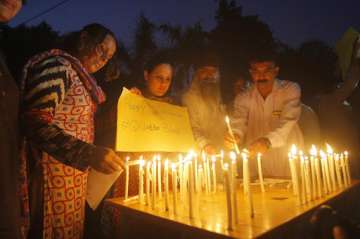Quetta hospital attack: Both Pakistan Taliban and Islamic State claim responsibility
Both Islamic State and a faction of Pakistan have claimed responsibility for Monday's terror attack at a civil hospital in Pakistan's Quetta which killed at least 70 people and injured over 100. Islamic State's Amaq

Both Islamic State and a faction of Pakistan Taliban have claimed responsibility for Monday's terror attack at a civil hospital in Pakistan's Quetta which killed at least 70 people and injured over 100.
Islamic State's Amaq news agency reported the Middle East-based movement was behind the atrocity. If true, it would mark an alarming development for Pakistan, long plagued by Islamist militant violence but most of it locally-based.
"A martyr from the Islamic State detonated his explosive belt at a gathering of justice ministry employees and Pakistani policemen in the city of Quetta," Amaq said.
Earlier, the Taliban faction, Jamaat-ul-Ahrar, said it was behind both the hospital attack and the killing of Mr Kasi.
Jamaat-ul-Ahrar [The Party of Freedom Fighters] split from the Pakistani Taliban two years ago.
In a statement, Ahsanullah Ahsan, spokesman for the Jamaat-ul-Ahrar militant group, said its fighters killed Bilal Kasi, the president of the Baluchistan Bar Association, then as dozens of lawyers gathered at the government-run Civil Hospital, a suicide bomber targeted the mourners.
The explosion took place shortly after the body of a prominent lawyer, who was gunned down in an attack earlier in the day, was brought to the hospital, said senior police official Zahoor Ahmed Afridi.
He was head of the Balochistan province bar association. He was shot while on his way to the court complex in Quetta.
It remains unclear if the two events were in any way connected.
Nearly 100 lawyers and others had gathered at the hospital at the time to express grief over the death of their colleague, Afridi added.
Prime Minister Nawaz Sharif strongly condemned the blast and expressed his "deep grief and anguish over the loss of precious human lives."
"No one will be allowed to disturb the peace in the province that has been restored thanks to the countless sacrifices by the security forces, police and the people of Baluchistan," he said in a statement. Sharif urged local authorities to maintain utmost vigilance and beef up security in Quetta.
Later Monday, the prime minister traveled to Quetta to meet the wounded and assess the situation. At a high-level meeting of security officials Sharif ordered stern action against terrorists.
"Terrorists are using innovating measures by hitting soft targets and one must respond in an advanced coordinated way," he said in a statement.
Earlier, Pakistan's powerful army chief Gen. Raheel Sharif also visited the hospital, and met with the wounded. According to a military statement, the army chief ordered intelligence agencies to track down and apprehend all those linked to Monday's attack.
Quetta and the rest of Baluchistan province, which borders Afghanistan and Iran, have long been plagued by insurgency. Several ethnic Baluch separatist groups operate in the resource-rich province, as well as al-Qaida, the Pakistani Taliban and other militant groups.
Lawyers have been targeted in the past by militants in various parts of Pakistan. They are considered an important part of civil society and emerged as powerful actors in 2007, when then-President Pervez Musharraf fired the chief justice, Iftikhar Mohammad Chaudhry. Lawyers launched nationwide protests to pressure Musharraf to reinstate Chaudhry. Later, political parties joined the campaign and Musharraf was ultimately forced to resign in 2008 and Chaudhry was reinstated.